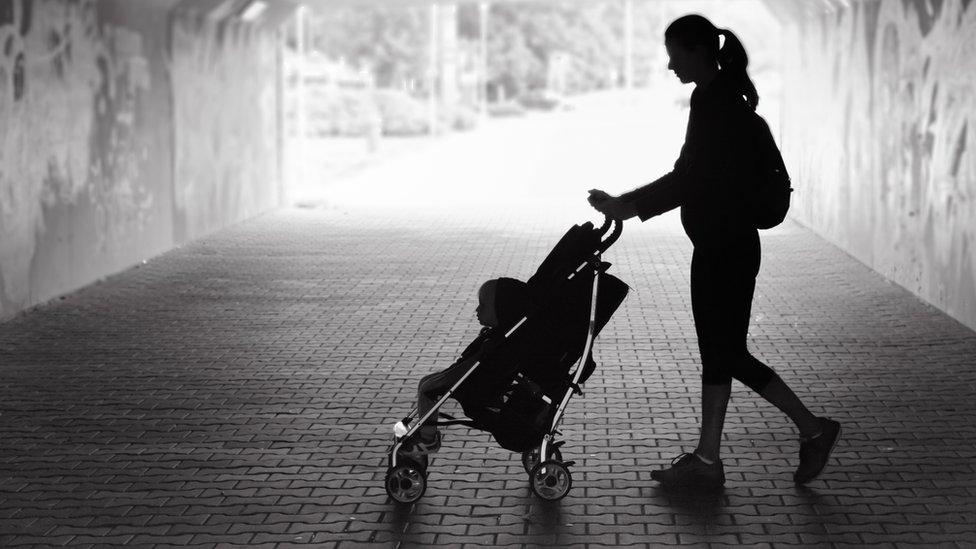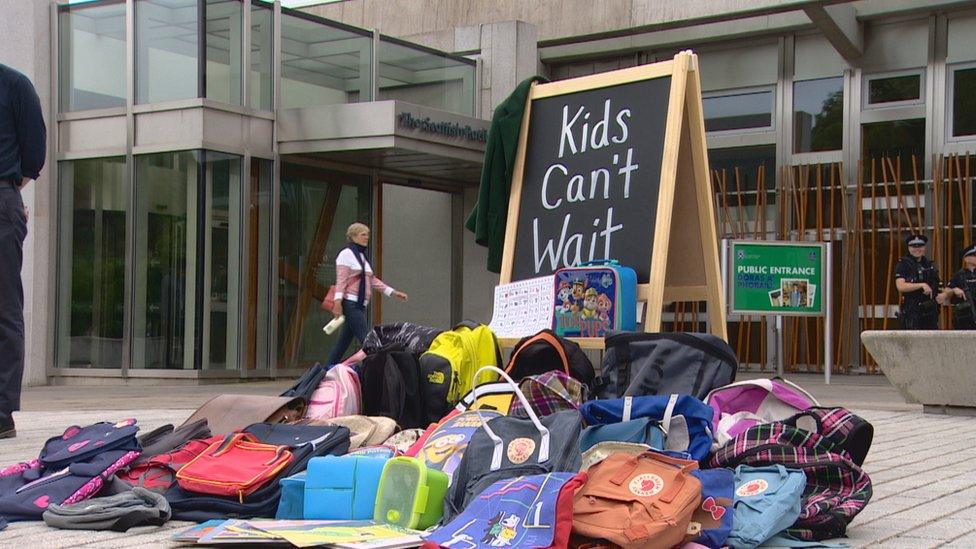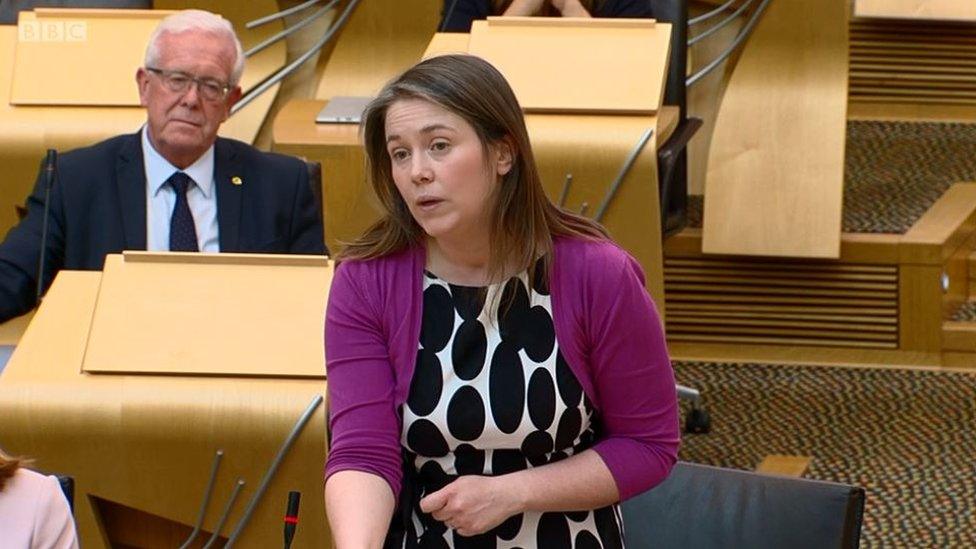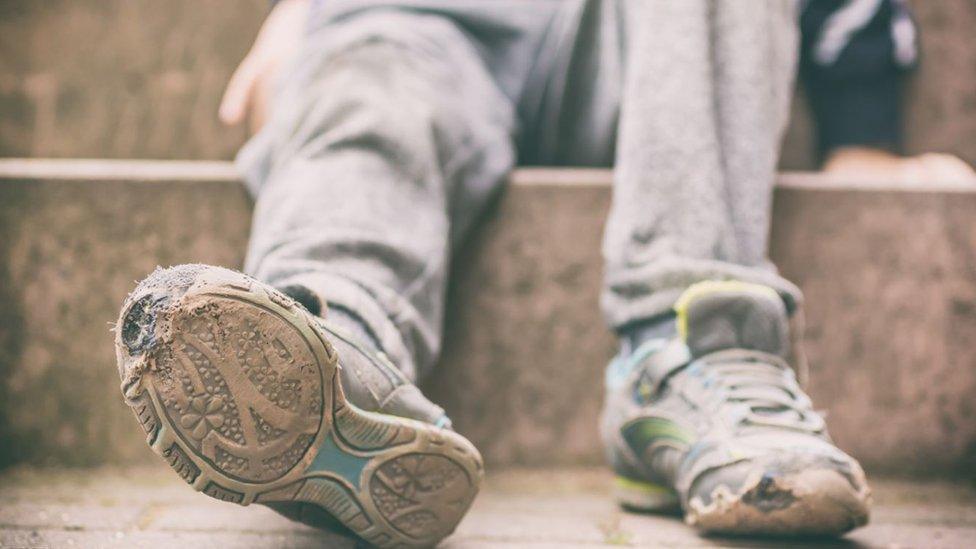New Scottish child poverty benefit brought forward
- Published
- comments

Plans to tackle child poverty by giving extra cash to low-income families in Scotland have been brought forward.
The new Scottish Child Benefit payment of £10 per week will be rolled out for eligible under sixes in 2021, and to under-16s by the end of 2022.
Ministers had been planning a "family income supplement", but were under pressure to bring it forward from 2022.
Communities Secretary Aileen Campbell said the move was "bold and ambitious" and would reduce child poverty.
The move has been praised by campaign groups, with the Poverty Alliance saying they were "delighted". The Child Poverty Action Group called it an "absolute game changer".
Latest government statistics, external indicate almost a quarter of children in Scotland are living in poverty.
That amounts to about 240,000 youngsters, where poverty is defined as the household income of below 60% of the UK median after housing costs. In 2018 the median UK disposable income was £28,000, external, and 60% of that is £17,040.
Last year, the Scottish government published its first Tackling Child Poverty Delivery Plan, external, which outlined a range of actions aimed at meeting child poverty targets. It was backed with a £50m fund.
On Monday, 70 organisations signed an open letter calling for the planned income supplement to be brought forward, arguing that waiting for 2022 was too late when many families were struggling now.
Campaigners had mounted a protest outside Holyrood prior to Ms Campbell's statement, with a display of schoolbags and textbooks and a blackboard proclaiming that "kids can't wait".

Campaigners made a display of school bags and books outside Holyrood
Ms Campbell told MSPs that the new benefit would be called the Scottish Child Payment, and would total £10 a week for all eligible children.
It will first be rolled out to children under six, as almost 60% of children in poverty live with a family with a child under this age.
The first payments should be made by the end of the current parliamentary term, in 2021, with the full roll-out to be completed "by the end of 2022".
At that point, 410,000 children could be eligible - over a third of all children in Scotland. The government estimates that the payments could lift 30,000 children out of relative poverty by 2024.
The minister said payments would now be made "much, much earlier than our original commitment".
She said: "We have listened to the voices of frontline poverty campaigners, including people with lived experience.
"We have therefore looked carefully at what is deliverable within an earlier timescale, considered what the effects to other aspects of our social security programme might be, and sought an approach that will have the biggest impact on children living in poverty."
Ms Campbell said ministers had made a "conscious and deliberate decision to prioritise action to tackle child poverty", warning that there would be "tough decisions and choices" to be taken to fund this.
She said child poverty plans would be to the fore in the next budget and spending review, and said the rollout of some other benefits - including a Scottish Carer's Allowance and a claims system for disability assistance - may have to be put back.

Aileen Campbell told MSPs that the rollout of other benfits may have to be delayed
The Child Poverty Action Group tweeted that they "hugely welcome" the announcement, saying: "This new payment is an absolute game changer in the fight to end child poverty."
Peter Kelly, director of the Poverty Alliance, said the move was an "important milestone", adding: "People who experience poverty, and the organisations that support them, have been listened to and actions is being taken. Today has shown that we can use our social security powers for a purpose - loosening the grip of poverty on peoples lives."
Citizens Advice Scotland said it was "a step in the right direction", and said it was "essential" to make sure those entitled to the benefit actually claimed it.
This point was echoed by some opposition politicians, who while broadly welcoming the move also questioned the delivery cost of the new benefit and details of how it would work.
- Published24 June 2019

- Published24 May 2019
